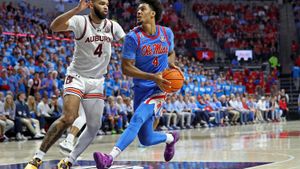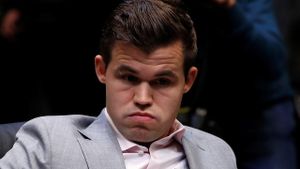The upcoming German federal election, set for February 23, 2025, is generating significant public interest as voters assess the competencies of the major candidates—Olaf Scholz of the SPD, Friedrich Merz of the CDU, and Robert Habeck representing the Greens. Recent insights from the RTL/ntv Trendbarometer, conducted by the Forsa polling agency, reveal nuanced perspectives among the electorate, which could influence the election's outcome.
When it came to foreign and security policy, neither Scholz nor Merz emerged as the clear favorite. Both candidates garnered 32 and 31 percent support, respectively, with Robert Habeck trailing at 12 percent. Notably, public sentiment varies distinctly between eastern and western Germany. While 40 percent of eastern voters view Scholz as the most capable, Merz holds the edge in the west with 34 percent backing.
On economic and financial matters, Merz claimed the highest confidence, achieving 42 percent approval. Among CDU/CSU supporters, this figure soared to 80 percent. Scholz was viewed positively by 49 percent of SPD supporters, and Habeck registered 42 percent among Green voters. The topic of internal security also saw Merz favored with 39 percent, compared to 36 percent for Scholz.
The sole arena where Scholz stood out was social justice, with 40 percent of the survey participants attributing this strength to him, leaving both Merz and Habeck at 18 percent each. Interestingly, 39 percent of CDU supporters align with Scholz on social equity over Merz's 34 percent. Meanwhile, 55 percent of Green supporters prefer Habeck's stance on this issue.
Environmental and climate policy, typically aligned with Green platforms, saw Robert Habeck receiving significant support—48 percent. This perspective extended beyond his party's base, with 92 percent of Green voters and notable figures from other parties acknowledging his expertise over his competitors.
Simultaneously, the political climate is shifting as the AfD, under Alice Weidel, experiences notable gains. Despite controversial statements by Weidel comparing Adolf Hitler to left-wing ideals, public interest has surged, pushing the AfD's approval ratings to over 20 percent, marking significant growth from previous months. The CDU/CSU's ratings have dipped to 31 percent, illustrating the fluctuative nature of party support as the election nears.
Should voters have the opportunity to select the Chancellor directly, both Merz and Habeck would tie at 23 percent, with Scholz securing only 17 percent and Weidel trailing at 16 percent. Alarmingly, about 21 percent of respondents would abstain from supporting any candidate.
Public trust poses another challenge; 53 percent of surveyed individuals believe none of the parties show competent political leadership, resulting from shifting political tides. According to the RTL/ntv-Trendbarometer, only 19 percent of voters expressed confidence in the Union’s ability to manage national issues effectively. The SPD received paltry support at just 7 percent.
Ahead of the federal election, the coverage of debates and candidate interactions is receiving considerable attention. RTL is set to host its only televised debate featuring Scholz and Merz on February 16, 2025, with discussions revolving around key national and international issues. RTL has confirmed the absence of additional debates featuring all major candidates, leading to criticism from the public and some political groups.
Besides this event, RTL also plans "RTL Direkt spezial" segments, where candidates will be interviewed individually on pressing topics. The lineup kicks off with Robert Habeck scheduled for January 14, followed by Scholz, Merz, Weidel, and Lindner covering subsequent weeks. These formats aim to engage voters and offer insights directly from the candidates.
Public interest remains high, with the January polling indicating 65 percent of voters rating the upcoming election as their primary concern, followed closely by economic circumstances at 25 percent. Surveillance of international affairs, particularly the situation in the United States and the conflict in Ukraine, indicated similar concern levels among respondents.
The political battleground is heating up with the far-reaching impacts of these developments influencing voter perception. With the election just weeks away, the key questions remain: who will emerge as Germany's new leader and how will the electorate respond to shifting narratives and candidate performances? Only time will reveal the outcome as parties recalibrate their strategies amid public sentiments and political discourse.
Overall, as the German federal election approaches, the dynamics between major political players, party standings, and public opinion will significantly shape the contest. These described trends suggest not just the stakes involved but also highlight the importance of direct voter engagement and the electoral debates set to take center stage against the backdrop of contemporary German politics.



